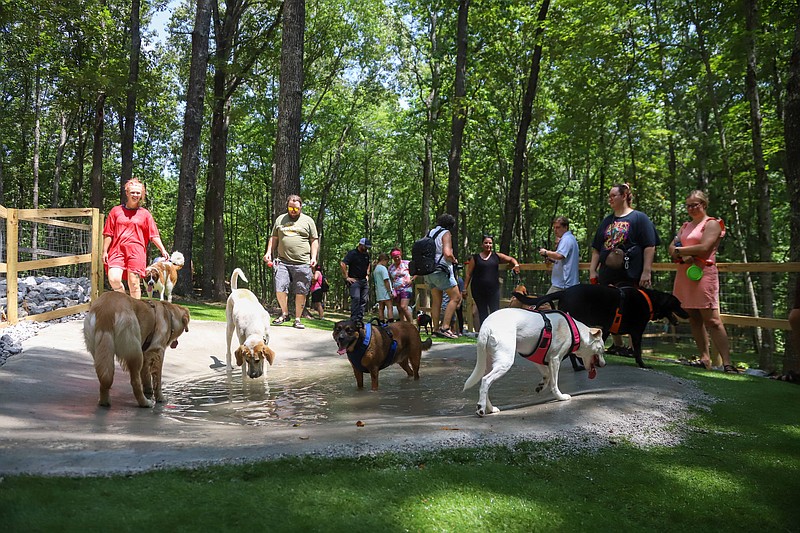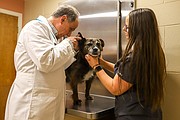As many families prepare to board their pets during their holiday travels, a mystery canine respiratory illness that's highly contagious and resistant to antibiotics has been reported in multiple states, including Georgia.
"We still don't know what it's coming from, whether it's a bacteria or a virus, although some people have got some suspicions," Dr. Jim Hammon, veterinarian at Northgate Animal Hospital in Chattanooga, said by phone.
As of Friday, Hammon had not seen any cases of the illness, which some are calling atypical canine infectious respiratory disease, in his practice and was not aware of any confirmed cases in Tennessee.
But since no diagnostic test or centralized reporting system for the illness exists, confirming cases is difficult and it's hard to know the extent of the outbreak.
"Until you know what the causative organism is, then you're not able to actually have a test that says, 'Yes, this is what we're dealing with,'" Hammon said.
Symptoms of the mystery illness include sneezing, snotty noses, goopy eyes, fever, lack of appetite and low energy. Sneezing and coughing may seem like choking or sound like a honk.
Photo Gallery
What Chattanooga dog parents should know about mystery respiratory illness spreading across US
Unlike other canine respiratory illnesses, such as kennel cough and canine influenza, the mystery illness does not respond to antibiotics. It also lasts around six to eight weeks rather than the typical one-week duration for kennel cough or two to three weeks for canine influenza.
(READ MORE: Chattanooga area seeing significant outbreak of canine respiratory illness)
"If a dog quits eating and really starts running fevers, it can develop into pneumonia, and some of those dogs have died," Hammon said. "So that's what's got everybody so concerned about it."
More than 200 cases of the atypical respiratory illness have been reported since August in Oregon, where it first appeared, he said.
It has since spread to 18 states across the nation, according to the University of Florida College of Veterinary Medicine Shelter Medicine Program website.
Veterinary schools and state veterinary diagnostic centers are doing genome testing to find a common link between cases and determine the cause of the illness, Hammon said.
The new canine respiratory illness has been seen primarily in veterinary clinics so far, and local shelters McKamey Animal Center and the Humane Educational Society have yet to see cases, according to McKamey Executive Director Inga Fricke and Humane Educational Society Executive Director Rebecca Bryan.
"It could hit us hard," Bryan said by email, adding that shelters across the nation are dealing with record-breaking kennel crowding, increasing outbreak risk.
Although the shelter has an aggressive upper respiratory infection quarantine, monitoring and treatment protocol in place, more than 100 dogs would need to be quarantined if the illness hits the shelter, Bryan said.
Like other canine respiratory illnesses, the mystery illness spreads through dog-to-dog contact, as well as through droplets released by barking dogs, Hammon said.
"Dogs that visit other dogs, dog parks, day cares and boarding facilities are most at risk," Bryan said, adding dogs that appear healthy can still be contagious without symptoms.
Hammon recommends dogs get the kennel cough vaccine, which protects against the bordetella bacteria and parainfluenza virus and is required to board dogs at most facilities. He also recommends dogs receive the canine influenza vaccine.
While those vaccines provide protection against the most common canine respiratory illnesses, they won't prevent dogs from getting the mystery illness, he said.
"We're just trying to cover them and make them as protected as possible for respiratory problems," Hammon said.
People should isolate coughing dogs and see their veterinarian as soon as they notice a respiratory issue, he said.
A veterinarian can provide supportive treatment, such as helping open the airways when there is difficulty breathing, and prescribe antibiotics to prevent a secondary bacterial infection, Hammon said.
"Vaccinate your pets, get them all up to date and have their immune system as robust as it possibly can be," Hammon said. "Try and avoid places where you have a large congregation of dogs as everybody's working diligently to try and figure out for sure what this is, how we can test it and how we can treat it."
Contact Emily Crisman at ecrisman@timesfreepress.com or 423-757-6508.

